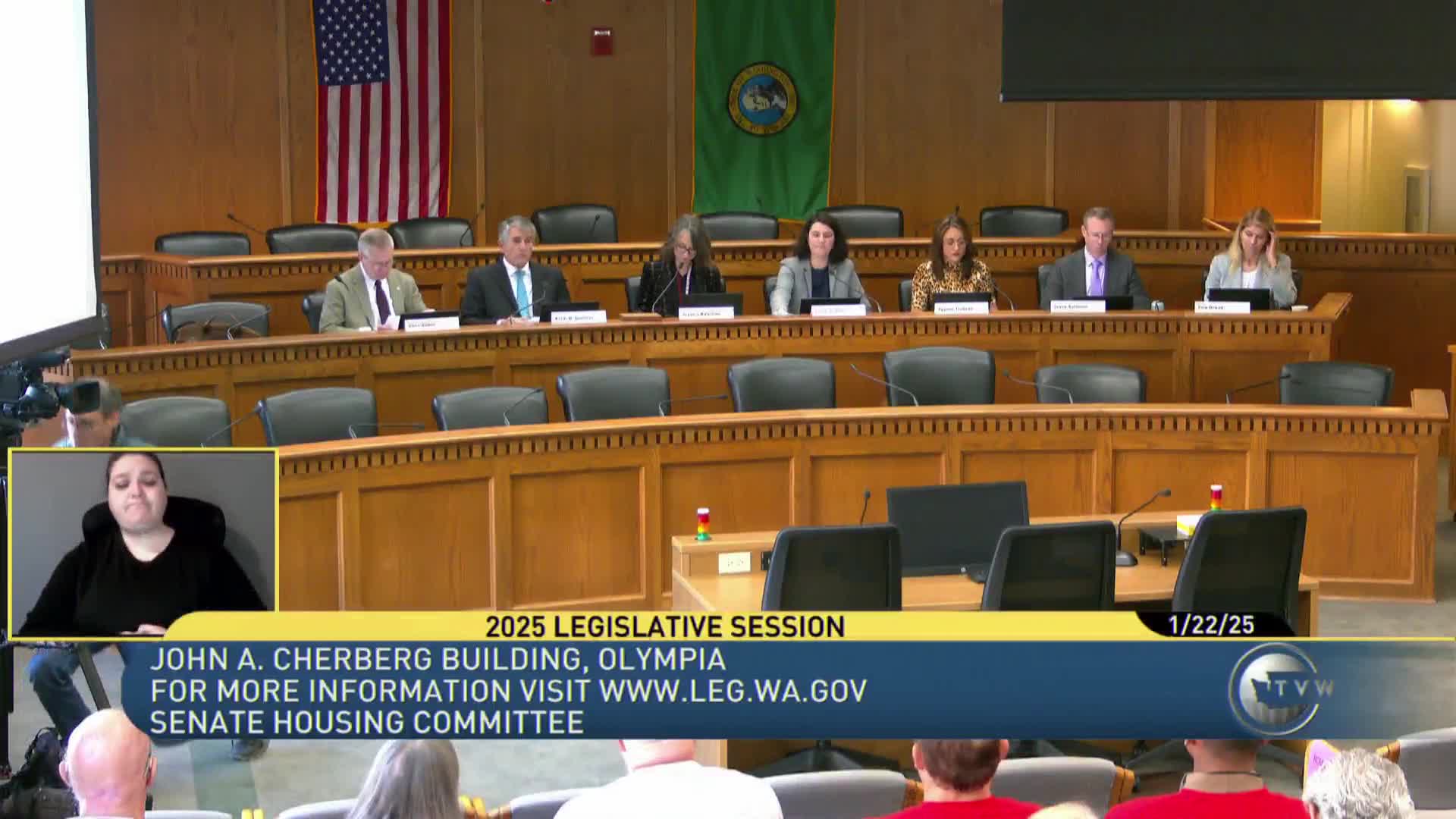Senate Housing Committee hears hours of public testimony on rent‑stabilization bill SB 5222
Get AI-powered insights, summaries, and transcripts
Subscribe
Summary
The Senate Housing Committee held a public hearing Jan. 22 on SB 5222, a renter‑protection package that would cap most rent increases at 7% per 12‑month period, require expanded tenant notices and enable Attorney General enforcement. Testimony ran for hours and included hundreds of in‑person and remote speakers; no vote was taken.
The Washington State Senate Housing Committee on Jan. 22 heard hours of public testimony on Senate Bill 5222, a package of tenant protections sponsored by Senator Trudeau that would cap most rent increases at 7% in any 12‑month period and add new notice, disclosure and enforcement requirements.
Senator Trudeau, the bill sponsor, told the committee the measure is intended to "inject stability and predictability for tenants feeling squeezed by unstable and untenable market" and called the bill “a guide to make rental increases fair and predictable.”
The measure would with limited exemptions: cap increases at 7% for tenants covered by the Residential Landlord‑Tenant Act and the Manufactured/Mobile Home Landlord‑Tenant Act; require annual written notice in a specified format and a 180‑day notice for increases of 3% or more; direct the Department of Commerce to create an online landlord resource center and commission a social‑vulnerability assessment of rent‑stabilization impacts; create a private right of action for tenants; and authorize the Attorney General to enforce renter protections under the Consumer Protection Act. Committee staff, Bill Fosbury, summarized those components for members.
Why it matters
Supporters said the bill would blunt rapidly rising housing costs, reduce displacement and protect people on fixed incomes. Shavona R. McEwen, an executive director of racial‑justice organizations, testified that renters are disproportionately people of color and said "People of color rent at higher rates than white folks. People of color are more likely to be rent burdened. People of color are more likely to face housing instability," and urged lawmakers to act.
Many local elected officials, tenants and nonprofit groups said rent caps are a necessary immediate tool while the state pursues longer‑term supply and subsidy policies. Pierce County Council Chair Jani Hitchen said caps would help service members and others on fixed federal allowances plan during deployments; Habitat for Humanity Seattle‑King‑Kittitas urged the committee to protect stability to help families build toward homeownership.
Arguments from opponents
Developers, housing finance professionals and many landlords urged rejection or major amendment, saying SB 5222 would reduce investment and new construction. Emily Thompson, partner at GMD Development, said she opposed the bill and warned that layered operating restrictions have already weakened housing operations in Seattle; she said the bill could produce similar effects statewide. AP Heard, a developer and land‑use consultant, testified: "Rent caps sound so reassuring but they severely limit market rate housing supply."
Financial, operational and legal concerns surfaced repeatedly: witnesses cited rising utilities, property taxes, insurance and repair costs; short fixed‑rate loan periods that reprice at higher indexes; and the risk that reduced investor returns would divert capital to other states. Several trade groups—the Association of Washington Business, the Building Industry Association of Washington and Washington Realtors—testified in opposition, arguing the bill would make Washington less competitive for development capital.
Mixed testimony from landlords and tenants
Small landlords and "mom‑and‑pop" owners offered mixed perspectives. Craig Peck, a landlord with two houses, told the committee that a 7% cap would still permit reasonable operating returns and that ownership provides other tax and appreciation benefits. Kathy Yazzie, a small landlord in Seattle, said she has never raised rent more than 7% and prefers stable tenants. Other small landlords said the bill as written would reduce their ability to manage risk, particularly where tenants cause property damage or do not pay rent.
Manufactured‑home residents and seniors described steep year‑to‑year lot‑rent increases and urged passage. Anne Sadler, a resident of Mount Vernon who said she is being treated for breast cancer, reported her space rent rose from $565 to $800 in January 2024 and then to $995 in January 2025.
Process and fiscal details
Bill Fosbury told the committee a fiscal note was requested Jan. 14 and is not yet available; he noted a partial fiscal estimate prepared for a House companion bill (HB 1217) that projected roughly $760,000 in additional operating expenditures for the Department of Commerce and Attorney General’s Office. The bill would also require the Department of Commerce to create an online landlord resource center and contract for the social‑vulnerability assessment.
Public input
Chair Bateman told the committee "Over 6,000 people have signed in on this bill. And the last time I was able to check, we have 183 people that have signed in to actually speak on this bill today." The committee moved through panels of in‑person and remote witnesses; because of the number of sign‑ins the chair limited later speakers to one minute each and reminded the public that written testimony can be submitted through the committee portal for 24 hours after the hearing.
Outcome and next steps
The hearing was a public hearing only; no committee vote on SB 5222 occurred during the Jan. 22 session. Committee staff accepted written testimony and the bill’s sponsors and members indicated deliberations and possible amendment would continue through the legislative process.
